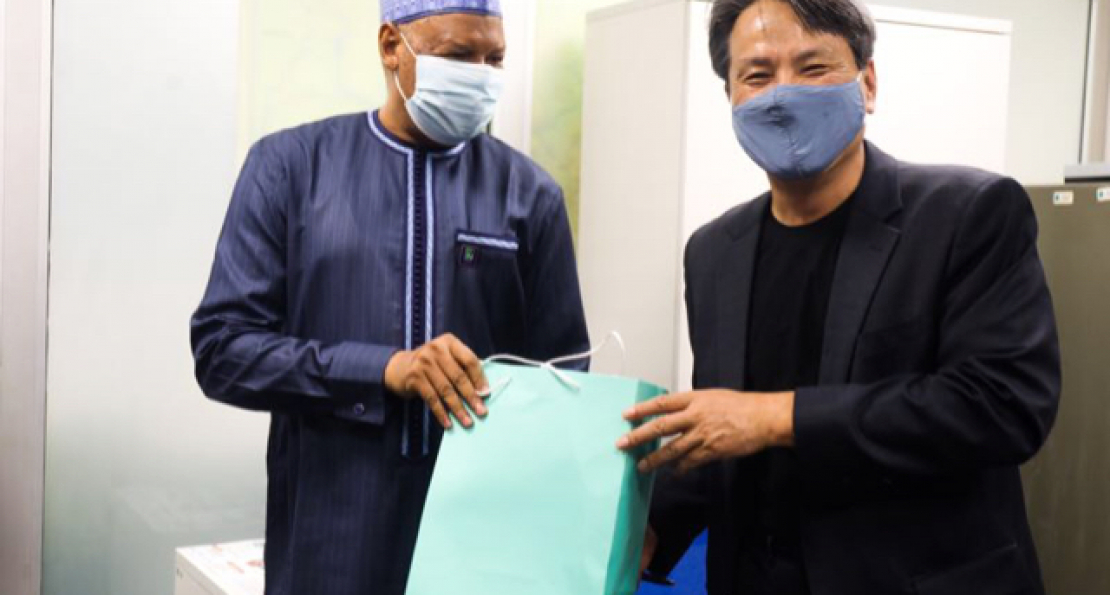The president of the American University of Nigeria (AUN), Professor Attahir Yusuf received the ambassador of the Republic of Korea to Nigeria, Kim Young-Chae on Thursday, 20 May 2021. “I have been here for about three months and I have been trying to understand a lot about Nigeria in terms of history, culture, and people. I have tried to meet young people and actually, this is my first time visiting a university to meet with students.” Said Ambassador Kim.

His visit is focused on cultural integration and strengthening ties between Nigeria and the Republic of Korea. “During my service in different parts of the world.., in terms of development and culture I have seen differences and I ask why are some nations rich while others are not so rich. These were some of the fundamental questions I asked as a diplomat. I tried to understand by reading books and meeting people. In the process, I discovered that education is one of the key pillars especially for women in any society all over the world. Women have experienced discrimination in terms of education. Women’s education is very important for our development and today I will discuss the Korean experience.’’
The ambassador was speaking to a cross-section of students at AUN. Earlier in the day, he commissioned a multipurpose community hall for internally displaced persons (IDPs) funded by the Korean government. AUN is a development university that has been championing humanitarian interventions in Nigeria’s Northeast. With the help of international organizations such as UNHCR, USAID, the EU, GIZ, and a host of others, the university provides livelihood support to internally displaced people. In the wake of the Bokoharam insurgency, AUN leveraged its geographic location to stem the tide of crisis in Nigeria’s North East. By implementing sustainable agriculture and education projects the university is keeping faith in its mission as a development university.
“Korea used to be very poor, even poorer than Nigeria in the 1950s. But we started to make economic development by transforming the agricultural sector, for example, in Nigeria, too many people are living in rural areas. Today I met a farmer; he told me he doesn’t have any machinery. He uses manpower and animal power that is the reason for poor productivity. In Korea, we try to reduce people in the countryside and transform them into manufacturing sectors so that our productivity level in agriculture will increase. Then reduce farmers from 40% to about 5% while massively investing in technology and machinery.”
“Education and industry should go together. Vocational training should be carefully planned. For instance, if we train a computer technician but nobody purchases computers, then there is no need for a computer technician in Yola. Education needs to be closely connected with the industry. When I was young in high school and university we had vocational schools for technicians and commerce which is very important. You are the leaders in Nigeria so you have to think of your future. Education is directly linked to development.”
To gain a better understanding of Nigerian culture, the ambassador has been meeting young Nigerians and people in the agricultural sector. At the university, he met student leaders. “ I think it was a very enlightening meeting. The ambassador was down to earth, we asked questions and he answered in the right way. He also shed more light on Korean culture. That made it very interesting I want to know so much more.” Said Economics major, Joy Jacob.
For Odinaka Okemini a Law major, the Ambassador’s talk unraveled the intricacies of international diplomacy.“ I really like the experience, when the ambassador spoke it helped me really understand what diplomats go through to defend their countries and develop relationships between countries. The answers he gave to the questions we asked were actually impressive. I learned about the rationale behind birth policy in South Korea and how it made sense for their country and how it worked out but I don’t know about Nigeria. But at least I understand how the ambassador was able to balance it.’ Said Odinaka.
South Korea is known for technology and a high education rate. Amongst the Organization for Economic Cooperation and Development (OECD) countries, Korea is one of the highest-rated with 31.5% of 25 to 64year olds attaining a bachelor’s or equivalent tertiary education. Governance and funding are organized to deliver the best education outcomes. AUN shares this vision. In 2017, the university placed second in the Facebook global digital challenge for peer-to-peer experiential learning. In 2011, a team from Google visited AUN to understand why the university was drawing more than half of Nigeria’s Google search traffic as observed on their usage map.
The university is highly driven by technology with WiFi across campus and state-of-the-art engineering science. Ambassador Kim regaled the audience with anecdotes of how Korea transformed its education and agricultural sectors by investing massively in technology. In particular, education was redesigned to focus on industry with the establishment of vocational schools. With AUN’s focus on research entrepreneurship and development, the university is on a similar trajectory. Since the establishment of diplomatic ties in February 1980, Nigeria and Korea have fostered close collaborative ties. The ambassador’s meeting with university students bodes well for the relationship between both countries.
Reported by Blessing Gabriel


